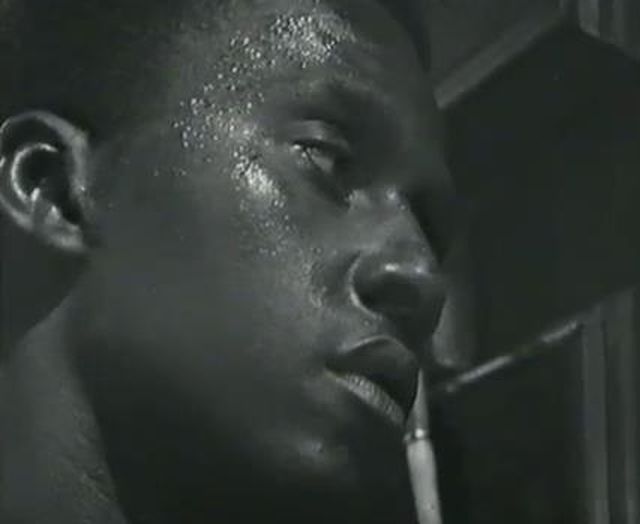
Tx 24th June 1964
A Place of Safety has something of an abstract opening. We see a man climbing up several flights of stairs, but then the camera seems to lose interest in him as it tracks away – firstly to record some children going down the stairs and then to observe a woman slowly walking upwards.
But we can still hear his voice. He’s banging on a door, demanding entry – promising that things will be worse if he has to come back. The relative peace is then shattered as the man falls down the stairs. We cut to the inside of a room to reveal a man holding a bloody axe.
If parts of Newtown (Z Cars‘ fictional location) were indeed new, then others most certainly were not. The building where the man (who we later learn is a bailiff called Wallace) lies injured is a crumbling wreck, mostly populated by those on the poverty line (and who also happen to be black). This doesn’t seem to please Fancy Smith (Brian Blessed) who is visibly exasperated when he’s unable to get any of the other residents to utter a word. He ironically comments that they’re deaf, but the inference seems to be that they can’t, rather than won’t, speak English.
To begin with, it’s possible that the same could be said for the man with the axe – Adignu Sadik (Johnny Sekka). Barricading the door, he’s depicted as a mute, irresolute figure. He’s not alone, as his wife Nana (Alaknanda Samart) and his two young children are also present. Bathed in sweat, Sadik doesn’t utter a word during these early scenes – not even when he’s tempted out of the room by Detective Chief Inspector Barlow (Stratford Johns).
Indeed it’s not until about twenty minutes in, when he’s being questioned at the police station by Detective Sergeant Watt (Frank Windsor), that Sadik utters his first words. And he’s revealed to be an articulate, softly spoken man, unable to explain why he should have exploded in a sudden burst of anger against Wallace.
That Sadik is not an unthinking, violent creature is surely an intentional piece of scripting – as several characters have already expressed negative opinions about Sadik and the black community in general. Wallace’s boss, Lowther (Norman Bird) regards them as savages whilst Fancy makes the unoriginal observation that they all look alike.
A Place of Safety doesn’t offer any glib answers or pat solutions and nor does it shie away from suggesting that the police are capable of prejudice just like anybody else. Barlow gently probes Lowther to try and find out what Wallace was like as a person – did he enjoy his job too much? Lowther reacts angrily. Wallace was an ex-copper, doing a dirty job, he says, but he didn’t deserve to be the victim of an unprovoked assault. After he leaves, Watt tells Barlow that Wallace does have a reputation as a troublemaker, but nothing ever comes of this (we never see Wallace after his tumble down the stairs, so he’s not a defined character).
Lowther bitterly believes that Barlow’s attempting to find excuses to excuse Sadik’s attack. But when Barlow and Watt are alone, Barlow admits quite the reverse – he suffers from prejudice as well, so he’s doubly keen to ensure that he treats Sadik fairly.
Johnny Sekka is excellent as Sadik, a man with no previous history of violence who finds events has spiraled out of his control. But the script also poses the question about exactly how much sympathy we should have for him. Another very strong performance comes from Alakanda Samarth as his wife, Nana. She has several key scenes, but possibly the most notable one is right at the end.
With her husband locked up, she and her children have been thrown out onto the streets. Watt arranges a temporary place for them to stay, but the children can’t remain with their mother. Fancy and Jock drop her off and there’s an intriguing moment of tension between her and Fancy. We’ve already seen that the bluff Fancy has an undisguised raft of prejudices and Nana is prepared to meet him head on – she’s proud and independent and can clearly pick up the negative signals from Fancy (and isn’t prepared to ignore them)
An excellent episode by John Hopkins, which also works as a fascinating slice of social history.